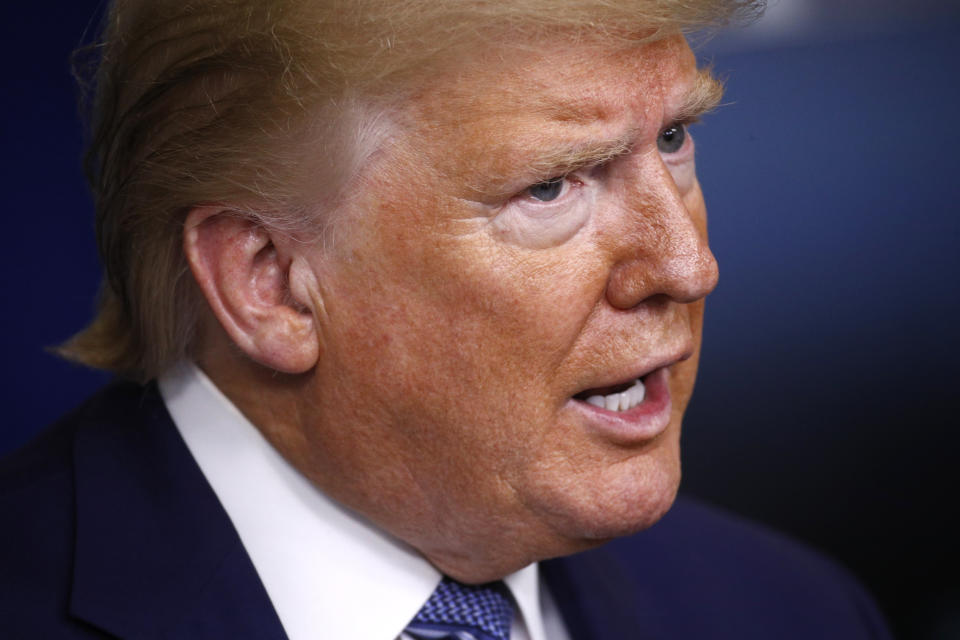Is Trump leading a 'war' against the coronavirus?
Regular viewers of the White House coronavirus task force briefings have probably noticed certain recurring themes in President Trump’s remarks: congratulating himself for acting swiftly to cut entry to the U.S. from China; praise for “the incredible people” on the podium with him and working behind the scenes; and an almost palpable yearning for a quick end to the pandemic and a resumption of “the greatest economy the world has ever seen.”
And repeatedly, a call to arms against the coronavirus, that “invisible enemy” attacking the United States, a “vicious” and “horrible” adversary. (Those are some of the favorite insults in his vocabulary, used indiscriminately against MS-13 gang members, Nancy Pelosi and journalists who write things he doesn’t like.) In mid-March, he proclaimed himself a “wartime president,” a theme he has returned to frequently, assuring Americans that they are in competent hands because “no one is better prepared to win a war than the United States military.” Doctors and nurses running into hospitals, pulling on their gear as they go, are “warriors” who are “rushing into war.” The coronavirus is “tough” and “smart,” he tweeted Sunday, but no match for Americans who are “tougher and smarter.”
Waging war on a disease is such a familiar trope it passes almost without notice: the “fight” against AIDS; the “struggle” to “conquer” smallpox, malaria, tuberculosis; health care workers on the “front lines” against Ebola, Zika, coronavirus. And Trump is hardly alone in anthropomorphizing the coronavirus; New York Gov. Andrew Cuomo used some of the same language in his daily briefing Sunday, calling the microbe “truly vicious.”
But there’s a case to be made that this represents a category error, which is why you don’t often hear this language from, say, Dr. Anthony Fauci, the top medical authority on the task force. Fauci knows that imputing malicious intentions or a bad attitude to a virus doesn’t advance our scientific understanding, and insulting a germ won’t make it go away. And while the term “warfare” is a useful metaphor for the kind of national mobilization that is necessary to save lives in this emergency, it’s not a useful way to think about the primary responsibility of ordinary citizens right now, which is to stay at home.

Thinking of a pathogen as an adversary that has to be killed in battle is a natural human impulse but arguably unhelpful in this situation. We aren’t locked in an existential battle against a “tough” or “smart” enemy, but against a speck of genetic material that obeys only one dictate, to reproduce itself. It does so, unfortunately, inside our own bodies, which is why it makes us sick. We will never kill every coronavirus in the world (setting aside the semantic and scientific debate over whether a virus is actually “alive” in the first place), and that’s not actually the goal of the “war”; it’s stopping the disease. There is a body of research that suggests a substantial fraction of the fatalities from COVID-19 are not a direct result of the virus’s attack on the body, but of a too-strong inflammatory response by the body’s own immune system, an event known as a “cytokine storm.” To use the military metaphor, the lungs and other organs are killed by friendly fire. This seems to happen more often in young people, and has been suggested as an explanation for the unusual pattern of deaths in the 1918 influenza pandemic, which was disproportionately fatal to otherwise healthy men and women in their teens and 20s.
The human body is home to hundreds of trillions of viruses, most of which, obviously, don’t kill us. They don’t even want to kill us — sorry, I mean it’s not to their advantage to kill us. We are their hosts, and unless they manage to infect someone else along the way, they die with us. If the coronavirus killed everyone, it would have to go back to infecting bats in remote caves in China, the predominant theory currently of its origins. It’s fine for researchers looking for a cure, or public-health officials trying to stem the outbreak, to treat the coronavirus as an “enemy” for now — as long as we bear in mind that the real goal is not to win a war, but to stop people from dying.
Or, as that fount of medical wisdom Donald J. Trump put it, in one of his more perceptive observations: “Unfortunately, the enemy is death. ... A lot of people are dying, so it’s very unpleasant. It’s a very unpleasant thing to go through.”
_____
Click here for the latest coronavirus news and updates. According to experts, people over 60 and those who are immunocompromised continue to be the most at risk. If you have questions, please reference the CDC and WHO’s resource guides.
Read more:


